SABA Head Says Today's Croatia Would Not Exist Without Partisan Struggle
ZAGREB, 9 May 2022 - The head of the Croatian Federation of Antifascist Fighters and Antifascists (SABA), Franjo Habulin, said on Monday, on the occasion of the Day of Victory over Fascism, that today's Croatia would not exist without the struggle of the World War II Partisan fighters.
"Croatia was founded on the antifascist struggle. Today's Croatia would not exist without the Partisan struggle," Habulin said at Zagreb's Mirogoj cemetery after a SABA delegation laid wreaths at the Tomb of the People's Heroes.
Habulin said that by marking the Day of Victory over Fascism they were remembering all who had given their lives so that Croatia could be an independent and free European country.
Speaking of the significance of 9 May 1945, when the forces of Nazi Germany laid down their arms after signing an unconditional surrender, which marked the end of World War II, Habulin said that today's Europe would not exist without the joint struggle of European countries on the side of the antifascist coalition, recalling that today was also Europe Day.
He added that in the past 30 years there had unfortunately existed in Croatia "open pro-Ustasha right-wing political tendencies", which distorted historical facts.
Asked to comment on the passivity of the government and the parliament in commemorating today's anniversary, Habulin said that those institutions should do much more than just pay lip service to antifascism.
Wreaths and flowers were laid at the Tomb of the People's Heroes also by President Zoran Milanović's envoy Melita Mulić, delegations of the Social Democratic Party (SDP) and the Social Democrats of Croatia, and of the embassies of France, Azerbaijan and Kazakhstan, while the SABA delegation also laid a wreath at the city's Dotršćina memorial park.
For more, check out our politics section.
Average Net Pay in Zagreb in February €1,146
ZAGREB, 9 May 2022 - The average net pay paid by legal entities in Zagreb in February 2022 amounted to HRK 8,640 (€1,146), an increase of 4% from February 2021.
Compared to the monthly national average, which amounted to HRK 7,452, the average take-home pay in Zagreb was HRK 1,188 (€157) higher.
The highest monthly net salary in legal entities in February was paid in the pharmaceutical industry, amounting to HRK 15,243, and the lowest in the leather industry, in the amount of HRK 4,994, the city's strategic planning and development department has reported.
The average gross salary in Zagreb in February was HRK 12,312, up 6.5% from February 2021.
For more, make sure to check out our lifestyle section.
Argentines Can Now Trace the Ship Their Croatian Ancestors Arrived On
May 9, 2022 - The Center for Latin American Migratory Studies developed an online search engine that allows you to find out, in just three steps, on what date and on what ship your Croatian ancestors set foot on Argentine soil.
Only with the surname, name, and validating the Captcha code it is possible to access the date of arrival of each of the immigrants who arrived in Argentina between 1800 and 1960, reports infobae.com. You will also be able to know which ship your Croatian ancestors traveled on and which port on the Argentine coast they arrived at.
All of this is now possible thanks to the online search engine of the Center for Latin American Migratory Studies (Cemla), which also allows us to find out what profession or occupation your Croatian ancestors had and from where in Europe they left. This possibility of knowing the history of each family that arrived in the country is the result of one of the most important tasks carried out by the organization, due to its meaning and scope.
Cemla was founded by Father Luigi Favero on December 28, 1985, preceded by the First Conference on Immigration and Identity, held in August of that year, and by the publication of the initial number of Latin American Migratory Studies, the first academic journal dedicated to exclusively to migratory issues in the subcontinent.
It also has an important Documentation Center specialized in national and foreign migrations from Argentina that has the objective of preserving the records of entry into the country for each of its ports as the first specialized library dedicated exclusively to migrations from Argentina. Currently, it has more than four thousand volumes between books and serial publications.
At the end of the 19th century and during the first decades of the 20th century, the great wave of European immigration to Argentina took place. Those who arrived, for the most part, came from Italy and Spain, but Ukrainians, Poles, Russians, Croats, French, Germans, Swedes, and Irish, among others, also arrived.
According to data from the University of Tres de Febrero and the book "Migration Policies in Argentina" by Susana Novick, between 1880 and 1915 more than 1,500,000 Europeans arrived on Argentine soil.
How to search in three steps
1. Enter the link: www.cemla.com/buscador/ (DUE TO GREAT DEMAND, THE DATABASE MAY PROVIDE ERRORS)
2. Write the surname and first name of grandparents, great-grandparents, or relatives who arrived in Argentina between 1800 and 1960.
3. Validate the Captcha code
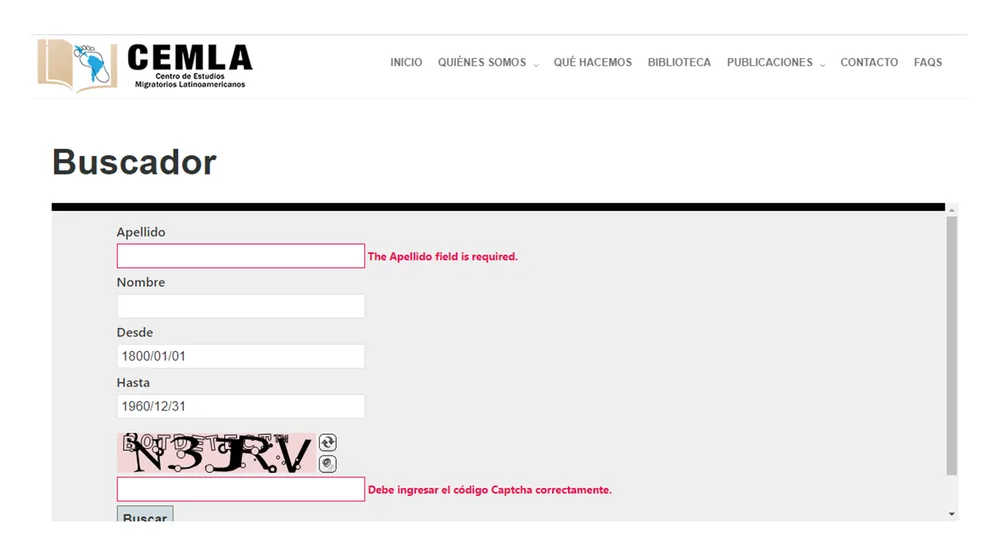
Image: infobae.com
Among its first tasks, Cemla began the preservation and microfilming of documentary sources of immigration in Argentina and, in particular, Italian immigration in Argentina, Uruguay, and Chile.
With the same desire to preserve history, it held special Congresses and Conferences that included the participation of specialists from various disciplines from both Argentina and Latin America.
For more news about the Croatian diaspora, visit our dedicated section.
Ex Economy Minister Ivan Vrdoljak Invests in Rovinj Campsite
May the 9th, 2022 - Former Croatian economy minister Ivan Vrdoljak has invested a large chunk of money in the Rovinj campsite (Porton Camp), which is set to re-open in about one week following a ''makeover'' of sorts.
As Poslovni Dnevnik/Marija Crnjak writes, the Rovinj campsite is set to re-open its doors as a more luxurious destination in a week's time, thanks to an investment of 3 million euros in the first 27 cottages which truly do stand out in terms of design and execution.
Everything there has been made in Croatia and are Croatian products, made of sustainable materials, and this is just the beginning of an ambitious investment in Porton Biondi, founded last year for the development of the camping business by Daniel Benussi, the owner of Auto Benussi, and Ivan Vrdoljak, known to the public as the former Minister of Economy in the Government headed by now President Zoran Milanovic.
From this tourist season on, this Rovinj campsite located between the city centre and the Amarin resort will operate under the Porton Nature Hideouts brand and will be promoted as a new and unique Croatian concept of tourist accommodation. The Rovinj campsite will be managed by the company Effectus Consulting, which has four more camps on the Adriatic in its portfolio through either ownership or management.
"We realised the acquisition of this Rovinj campsite back in the spring of 2021, and the main reason for it was the untapped potential given the then state and categorisation of the campsite. We were most attracted by the phenomenal location with a beautiful view of the city of Rovinj, a few hundred metres from the city centre, and a beautiful beach right in front of the camp.
From the acquisition itself, we started with the development of a master plan for landscaping, which we'll implement in several phases, the first of which began in the autumn of 2021, and we're currently in the final works before opening everything up. We want to contribute to further development as well as work intensively on expanding the tourist season,'' Daniel Benussi stated. Currently, only Porton Camp in Rovinj is included in Porton Biondi's portfolio, but Benussi isn't ruling out the possibility of expanding to other attractive tourist projects.
The investment is worth about 3 million euros, and additional investments are planned. This summer season, there will be 27 Porton Holiday Homes houses with a swimming pool, which represents about 10 percent of the total accommodation capacity of the camp, on offer to visitors. The plan is to increase that share to 100 percent when the investment cycle is completed, and in one of the next phases, the construction of a shared pool, wellness and children's playroom is also planned.
These investments also relate to the brand strategy and the creation of a new visual identity, for which the Bruketa & Zinic & Gray agency was placed in charge. The accommodation facilities located within the Rovinj campsite are designed right here in Croatia and are completely and utterly adapted to the natural environment without causing disturbances. They're built of sustainable materials and are equipped with Croatian products, wherever possible, explained Zvonimir Tudorovic, the founder and director of Effectus Consulting.
For more, make sure to check out our dedicated business section.
What Will Average Croatian Wage and Pension be in Eurozone?
May the 9th, 2022 - With Eurozone entry rapidly approaching and due at the very beginning of next year, just what will the average Croatian wage and pension be? It seems an increase is on the cards.
As Poslovni Dnevnik writes, when Croatia introduces the euro at the beginning of 2023, the average Croatian wage (net salary) will stand at around 900 euros, and an average pension will stand at around 320 euros, considering the fact that due to ongoing inflation, personal incomes and pensions across Croatia could increase slightly before the changeover from the kuna to the euro anyway.
If we take in some information and consider it relevant data on the average net salary across the EU back in 2021, which amounted to 1916 euros per month, it means that the average Croatian salary needs to be about a thousand euros to reach the EU average. In nearby Austria, the average net salary last year was 2053 euros, and in Belgium - an impressive 2091 euros.
In Bulgaria, the average net income last year was 413 euros, and the average Croatian wage was 797 euros, while the neighbouring Slovenians received an average of 1,038 euros per month back in 2021, writes Slobodna Dalmacija.
The Czechs were doing slightly better than the Croats were with a typical net salary of 813 euros, and the Danes were much better, with 3,100 euros, placing them at the very top of the European Union (EU). They are closely followed by the Swedes with a salary of 3062 euros.
The Estonians are also better paid than Croats typically are, with an average salary of 958 euros net, with the Latvians and Lithuanians being weaker with 648 euros and 645 euros respectively. The people of Cyprus receive an excellent 1,658 euros, and Malta also earns well from the Croatian perspective, with an average Maltese wage being about 2261 euros per month.
They are followed by rich EU countries: Finland with 2509 euros, France with 2157 euros and Germany with 2270 euros as an average salary.
The average Greek earns 917 euros, a Portuguese worker 846, a Pole 736, a Slovak 690, and a Hungarian 683 euros. Over in Romania, the average net salary is only 522 euros, meaning that only the Bulgarians are the poorest in the EU.
The average net salary in Italy is 1,762 euros, and in neighbouring Spain 1,718 euros. The real "heavyweights" are the Icelanders with 3435 euros and the Luxembourgers with 3009 euros, followed by the Irish with 2479 euros and the Dutch with 2263 euros.
For more, make sure to check out our lifestyle section.
Tripadvisor Ranks Rijeka Market Among 10 Most Attractive Sights in City
May the 9th, 2022 - Tripadvisor has ranked Rijeka market among the top ten sights to see when paying a visit to this increasingly popular Kvarner city along the Northern Adriatic coast.
As Morski writes, over more recent years, the City of Rijeka has become increasingly popular as an urban tourist destination, seeing it attract more and more visitors from all over the world, which simply wasn't the case a decade or even five years ago. One of the favourite locations in this city is Rijeka market, which the famous tourism and travel portal Tripadvisor has ranked among the ten most attractive sights to see in all of Rijeka.
A wide variety of colours, tastes and smells - Rijeka market... placa, pjaca - is a favourite destination of many Rijeka locals, as well as for an increasing number of tourists. An unavoidable stop for them, of course, is the fish market.
Fish and seafood were once sold outdoors, and the first fish market was built in the second half of the 19th century. Today's fish market, where many are happy to buy produce from and frequently return to, was built back in 1916 and is the work of architect Carlo Pergoli, as reported by HRT.
''Pergoli pointed out his fondness for the Viennese secession in arranging the interior of this building, it's a very interesting fact that this building even had electricity back at that time,'' explained Marta Polic from the Public Relations Department of Rijeka Plus.
Rijeka market, which in addition to its wildly popular fish market includes two pavilions of a recognisable green colour, is a protected cultural monument. Tourist guides often include this location in guided tours of Rijeka and it has regularly been described as an atmosphere that is rarely encountered in any other similar location.
For more, make sure to check out our dedicated travel section.
Can Brits Purchase Croatian Property? Yes They Can, Here's How
May the 9th, 2022 - Brexit resulted in more questions than it did answers, and whatever side of the fence you happen to be on, be it Bremain or Brexit, we can all likely agree on that. British nationals living across the EU ended up in strange and often unclear positions overnight, with very real legal and financial worries on their plates. With that being said, can Brits purchase Croatian property now Brexit is done, dusted and in the past? Yes.
''Can Brits purchase Croatian property?'' is a question that I see often, and the answers provided are somewhat vague. Given that the United Kingdom is no longer an EU member state, British citizens are no longer EU citizens, meaning that certain rights which were once afforded to them merely by being the holders of British passports no longer apply. Brits can no longer take up residence in Croatia with a quite registration and the flash of a UK passport like they once could, and only those Brits who were here before Brexit and who have acquired rights are still treated like EU citizens.
Up until February the 1st, 2020, ironically just before the global coronavirus pandemic reached Europe and caused havoc like we've never seen before, Brits could purchase property in Croatia as they were EU citizens. The same continued to be true between that aforementioned date and the 31st of December, 2020, during a transition period when all EU law continued to apply to the UK as it slowly made its way out of the bloc of which it had been a leading, powerful and wealthy member for over 40 years.
During the UK's transition period out of the EU, British (and as such EU) nationals were free to purchase Croatian property without having to get any particular permissions and without having to engage in anything out of the ordinary. This applied to all property with the exception of what was classed as ''property and real estate in protected areas'' and agricultural land. Then came January the 1st, 2021, and everything changed for Britain. That was the real D-Day, when the UK ceased to be a member of any kind of the EU, the transition period ended at midnight (Central European Time) on the 31st of December, 2020.
The answer to the question of: Can Brits purchase Croatian property? was expected to change, but it didn't alter all that much. In short, yes they can, but that desired property absolutely needs to be classed as a residential property, and for that it must be in a certain ''zone''. This is all based on reciprocity agreements held between the Republic of Croatia and various other countries, and this functions in the British sense much like it did before Croatia joined the EU back in July 2013.
A tip for looking this sort of agreement up in Croatian would be to Google: Uzajamnost za stjecanje prava vlasnistva na nekretninama u Republici Hrvatskoj.
It sounds a little bit complicated, but in reality it isn't. If a Croatian citizen can buy property in a certain country, then the citizens of whatever country that might be can typically do the same in Croatia, with certain conditions attached in each specific case. You also do not need to registered as a resident of Croatia in order to buy a property here.
So, what needs to be done?
Consent for the acquisition of ownership rights over Croatian property by foreign citizens who aren't nationals of the EU/EEA or an EFTA country requires what everyone in Croatia just adores - an administrative procedure. I can hear you jumping for joy just reading that. A Brit intending to buy a property here must first make a request to the Ministry of Justice.
In the case of a British citizen who isn't protected by the Withdrawal Agreement wanting to purchase a property here, this procedure is conducted at their request to purchase real estate. Again, that real estate needs to be ''zoned'' as residential, and Brits cannot purchase agricultural land, nor can they buy property situated in a so-called protected area.
An updated list of countries (aside from the UK) which comply with the reciprocity principle is available under Information on reciprocity in the acquisition of ownership rights of real estate between the Republic of Croatia and countries other than EU Member States, the Republic of Iceland, the Principality of Liechtenstein, the Kingdom of Norway or the Swiss Confederation.
The procedure is laid down in the provisions of the Act on Ownership and Other Real Rights and the Act on General Administrative Procedure. A mouthful, I know. Any submitted application must be written and then be submitted to the Registry and Archives Department. This can be done by post to the following address:
Croatian: Ministarstvo pravosudja i uprave Republike Hrvatske,
Uprava za gradjansko, trgovacko i upravno pravo
Ulica grada Vukovara 49, 10000, Zagreb, Grad Zagreb, Republika Hrvatska
English: The Ministry of Justice and Public Administration of the Republic of Croatia,
The Directorate for Civil, Commercial and Administrative Law
City of Vukovar Street 49, 10000, Zagreb, Croatia
The following documents must be enclosed along with your (written) application form:
- An acceptable legal basis for the acquisition of ownership (this can be a property purchase agreement, the deeds proving the property has been gifted to you, etc). These documents can be in their original form, or they can be certified copies.
- Proof of ownership from the seller of the property, such as a copy from the land register confirming their ownership.
- A certificate of the administrative body responsible for urban and physical planning, according to the location of the property, on the legal status of the property.
- Proof of the prospective owner's nationality (such as a certified copy of their passport showcasing their citizenship) or proof of legal entity status (evidence with a copy from the court register) if the prospective owner is a foreign legal entity.
- When the applicant is represented by an attorney-in-fact, the original power of attorney or a certified copy thereof must be submitted.
In certain cases, additional documentation will be sought from would-be buyers of Croatian property. It all depends on the individual request.
So, in short, the answer to Can Brits purchase Croatian property? is a resounding YES, given that all of the requirements for reciprocity have long been met. This was of course helped not only by the UK's recent EU membership, but also by the fact that Croatia is the EU's youngest member state and that many bilateral agreements between the UK and Croatia before Croatian EU accession were long-standing and clear.
For more, make sure to check out our dedicated lifestyle section.
HNL Round 34 Recap: Hajduk Beats Rijeka, Dinamo Tops Osijek in Derby Weekend
May 9, 2022 - The 34th round of the Croatian First League was played from May 6 to 8, 2022. This derby weekend featured Rijeka-Hajduk and Dinamo-Osijek, with both Hajduk and Dinamo winning 3:0, leaving Osijek out of the title race. Here is our HNL round 34 recap.
Hr. Dragovoljac v. Slaven Belupo (1:1)
Dragovoljac and Belupo opened the 34th round on Friday, May 6, 2022, in Zagreb.
Frigan gave Dragovoljac the early lead for 1:0 in the 3rd minute Krstanovic was unable to equalize for Belupo until the 50th minute for 1:1. Karrica received his second yellow in the 81st minute, forcing Dragovoljac to pay with a man down for the remainder of the match.
Dragovoljac remains in the last place with 19 points and will be relegated from the First League, while Belupo is in 7th with 35.
Gorica v. Lokomotiva (3:3)
Gorica and Lokomotiva met on Saturday, May 7, 2022, in Velika Gorica.
Atiemwen made it 1:0 for Gorica in the 24th minute while Kalik scored for 2:0 in the 39th. Pivaric came back for 2:1 Lokomotiva three minutes later. Pivaric received his second yellow in the 67th minute, leaving Lokomotiva with a player less. However, Keita was also sent off just 5 minutes later, leveling the playing field. Kulenovic scored for 2:3 in the 85th minute and Kalik scored a penalty for 3:3 in the 90th minute which was the final score.
Gorica is currently in 6th place with 41 points, while Lokomotiva is in 5th with 46.
Istra 1961 v. Sibenik (1:2)
Istra and Sibenik met on Saturday, May 7, 2022, in Pula.
Delic put Sibenik ahead in the 26th minute for 0:1. Curic made it 0:2 just before the half. Caseres came back with a goal for 1:2 in the 73rd minute, which was the final score.
Istra is currently in 9th place with 28 points, while Sibenik is in 8th with 32.
Rijeka v. Hajduk (0:3)
Rijeka and Hajduk kicked off the first big derby on Sunday, May 8, 2022, at Rujevica.
Two Livaja goals in the 13th and 37th minutes put Hajduk ahead by 0:2. Mikanovic scored for 0:3 just before the half. Drmic was shown a red card in the 56th minute, forcing Rijeka to play with a man down for the remainder of the match.
Rijeka is currently in 4th place with 61 points, while Hajduk is in 2nd with 69.
Dinamo v. Osijek (3:0)
Dinamo and Osijek closed out the 34th round on Sunday, May 8, at Maksimir Stadium.
Orsic put Dinamo in the 1:0 lead in the 34th minute. Osijek's Cheberko was shown his second yellow just 10 minutes later, forcing them to play with a man down for the rest of the match. Spikic made it 2:0 for Dinamo in the 60th minute before Menalo secured Dinamo's win in the 80th for the final 3:0.
Dinamo is currently in 1st place with 73 points, while Osijek is in 3rd with 65 and is no longer in the title race.
With just two rounds to go, Dinamo and Sibenik meet next Sunday in Sibenik, while Hajduk and Istra meet on Saturday at Poljud. If Dinamo draws or loses to Sibenik, the Croatian champion will be determined in the final round at Maksimir Stadium between Dinamo and Hajduk.
You can see the HNL standings HERE.
To read more about sports in Croatia, follow TCN’s dedicated page.
5+ Years Living in Split: Expats Andy and Cindy Elder from England
May 9, 2022 - In our new TCN series, we uncover the lives of expats that have spent over 5 years living in Split. Next up, meet Andy and Cindy Elder from England!
Two idyllic weeks on a Croatian beach is very different from the realities of full-time living. So what is it really like to live in Croatia as an expat? In a new series on TCN, we meet expats who have lived here for 5 years or more, to find out from them the good, the bad, and the ugly of 12-month living in Croatia. Next up, Andy and Cindy Elder from England.
1. Tell us firstly how you came to Croatia? What motivated you to choose this slice of paradise and how long have you now been here?
We met 17 years ago on a dating site after both of us having been widowed. Andy was already into sailing and had a dream. He wanted to retire early and buy a boat to live on and travel. He took me on several sailing holidays, including around Dubrovnik, so I could see if I would enjoy that life. On our last trip, we decided to hire a catamaran. I thought it might be more comfortable to live on, instead of a monohull. There weren’t many places that had the second-hand make and model we wanted, but Croatia was one of them. It seemed ideal, as the others tended to be in the Caribbean, a bit far to organise from England! I was still working, so Andy made a trip to Split to see the boat, sent me the photos, and we fell in love with it. He then made several trips by car to finalise everything, the last one coming back only a day before our wedding! We spent our honeymoon on our catamaran “Two Can Play”, and then went back to get everything packed, and either drove it back here, or delivered on pallets through a transportation company. I don’t think we would have made such honest and helpful friends anywhere else. Must have been fate to come to Croatia. We’ve never regretted it.
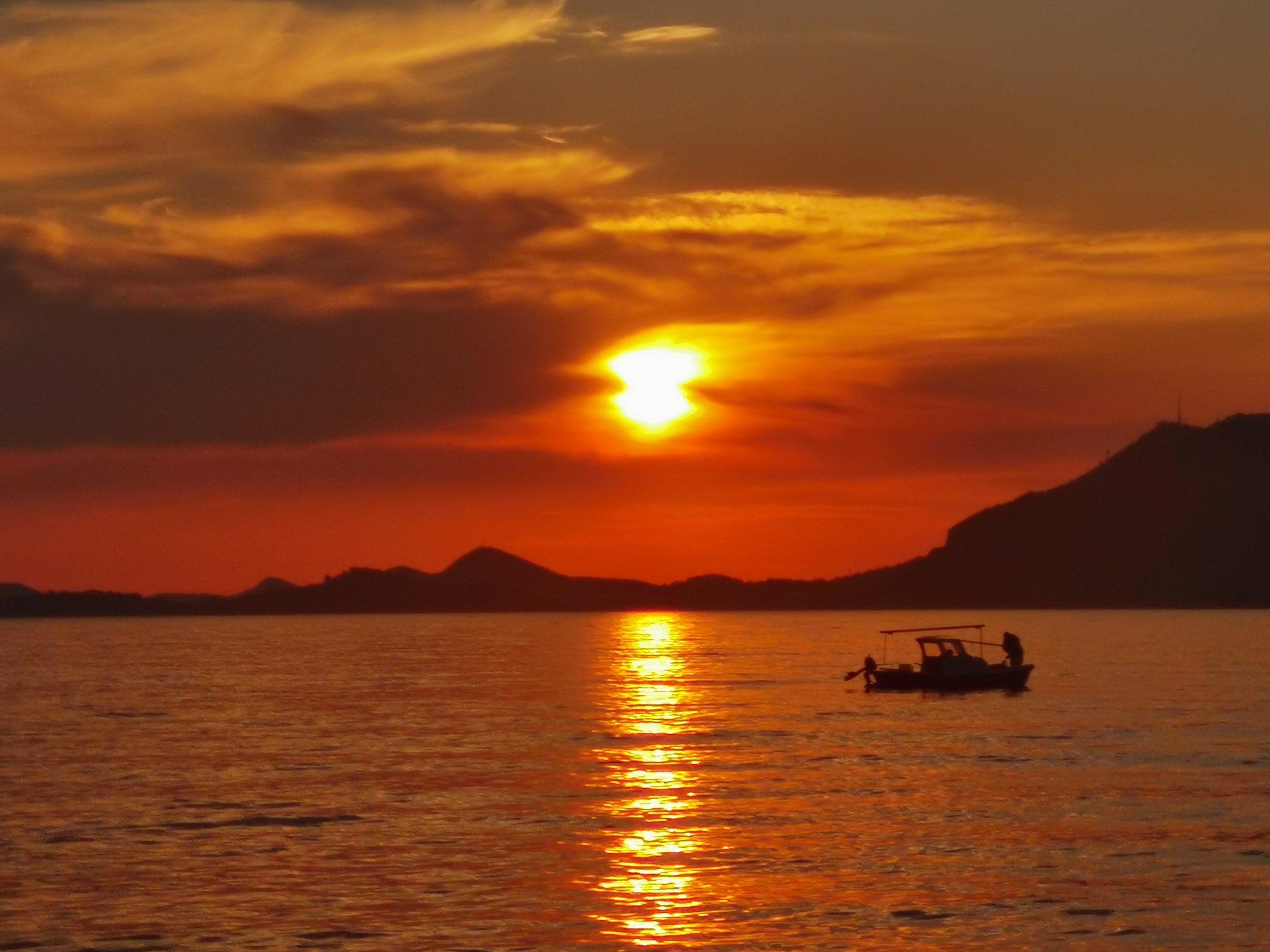
2. Looking back, what were your perceptions and expectations?
We expected to stay here a year, then sail onto Greece and further. There was so much to see that we decided to stay another year to see the rest of the coastline, and a few places inland by car. Then Covid hit. We decided that it was better to stay here, visiting places we knew, knowing people who could help (we got our resident permits after Brexit with A LOT of help from our friend in Split! We have a doctor and a dentist. Andy is currently in hospital in Zagreb after having to wait 2 years because of Covid to get surgery to repair the blocked main artery in his leg. Another story for another time maybe!
3. After 5 years here, how have those perceptions changed. Do you now view Croatia differently?
We didn’t think we would love it here so much that we would still be here 5 years later, Covid or not. Even after 5 years, there are still places we would like to visit. We didn’t realise just how rich and diverse the history is. The people here are so friendly, helpful, and generous. We do think, however, that our friend here in Split might just sabotage us ever leaving the country!!!
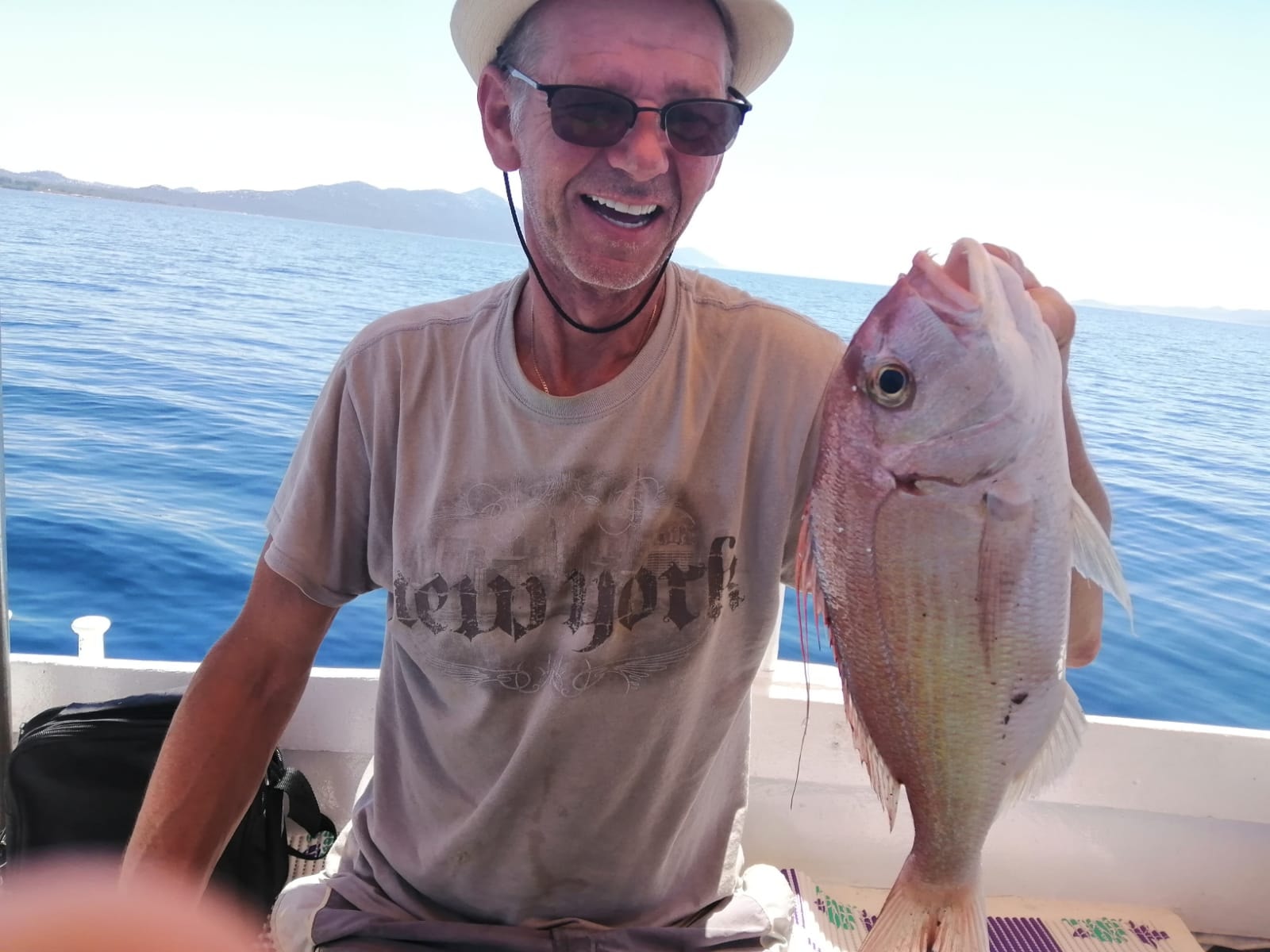
4. After your time here, the 3 things you love most about Croatia?
First: The people. We have made the most amazing friends here, in Cavtat/Dubrovnik, Split, and Zagreb. The best friends you could possibly have. We just wish your language wasn’t so hard. I can speak German and some other languages enough to get by. The Germanic and Latin-based words I can just about handle, even the Slavic ones, but the rest? We still keep trying though!
Second: The food! I am always telling people that the best beefsteaks are in Croatia, and their pizza is better than in Italy
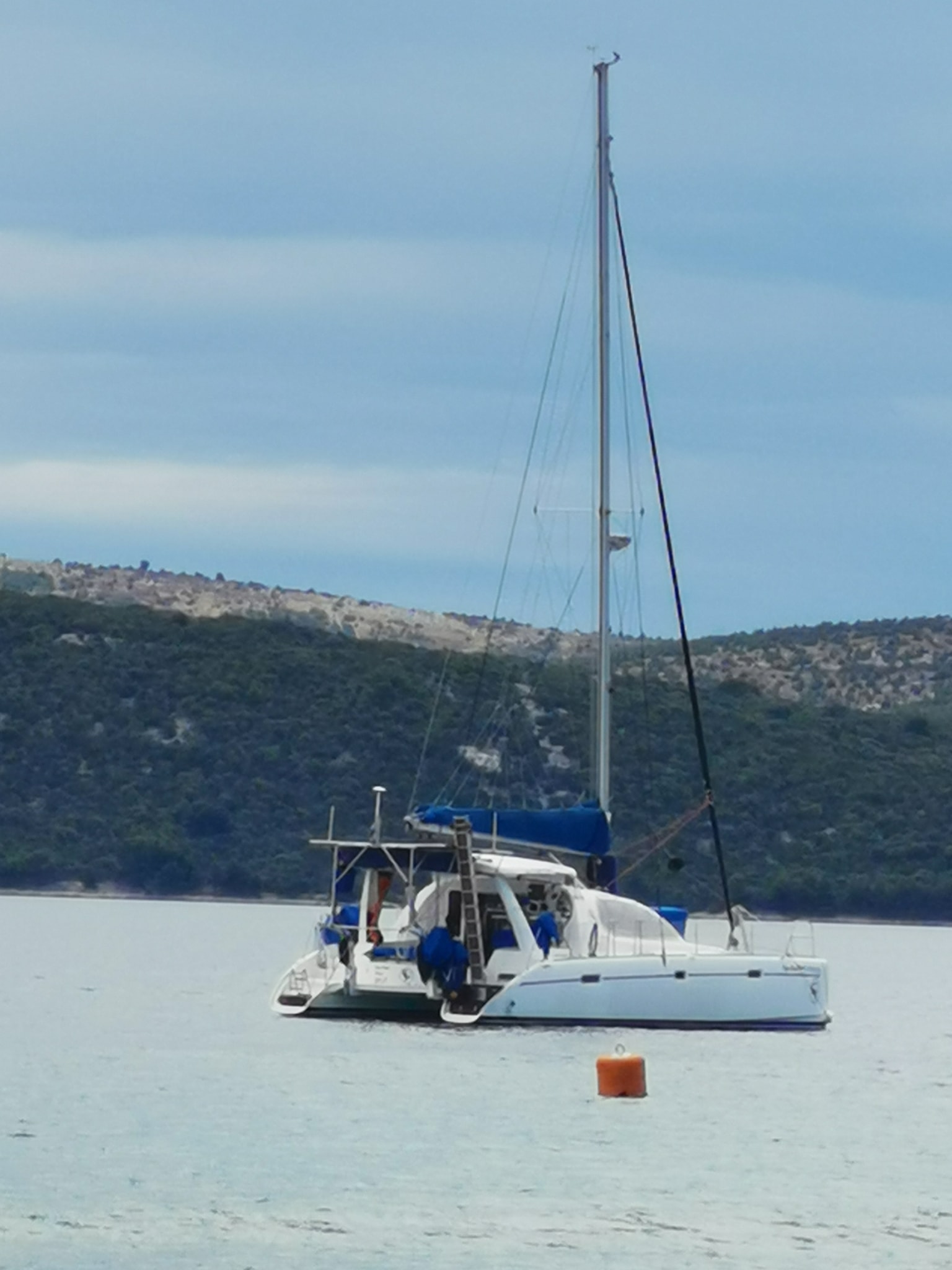
Third: The history. An almost intact Roman arena older than Jesus? Roman artifacts everywhere? Places that look like Venice or Vienna? The history and beauty of this country is hard to beat.
5. And the 3 things you would like to change.
First: Not so many stamps! It’s a common joke of ours to make fun (lovingly) of the bureaucracy in this country. Need a document? Go to 5 different places, and get it stamped in each place. Then maybe you can get or do what you need.
Second: Need your car M.O.T.? Spend all day queueing up to get it passed.
Third: Arrange for someone to come to fix or install anything? Don’t expect them to turn up on time, or even on the same day.
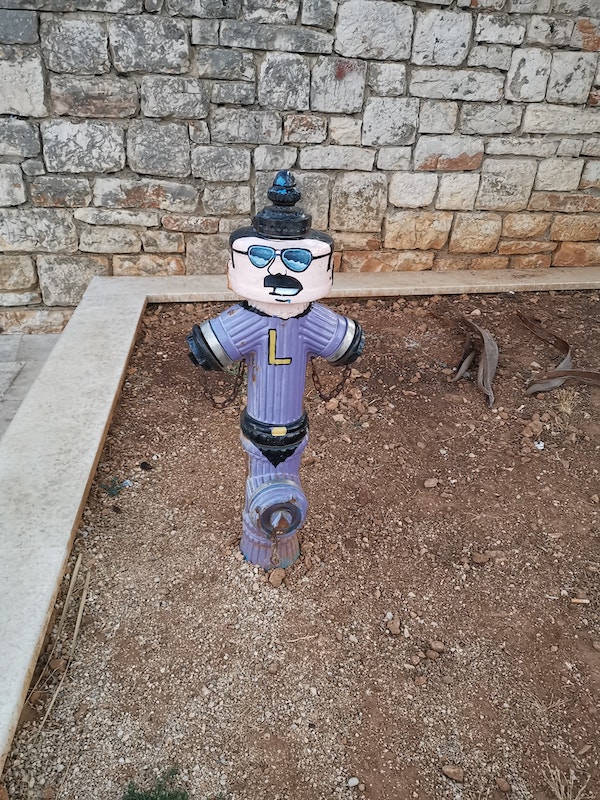
6. Given your experiences, what advice would you give to any would-be expat thinking of making the move?
Go for it! Life is not a dress rehearsal! If you make friends here, they are so kind, helpful, and caring. Just learn that things happen slowly. There is a bit of a “manana” attitude to life here we find both wonderful and infuriating! Think of how long any officialdom should take, then double or triple it. Worth it in the end.
7. The most beautiful place in Croatia, and why?
We can’t really just pick one, it’s a beautiful country! We love Split, it’s alive still in the winter, and not too cold. However, it’s a bit too cold and damp to stay on our boat in the Winter, so for those months we stay in an apartment in Split. It’s great that we can go out to dinner, the movies, and see friends. Lots of great places nearby we can visit by boat or by road. Trogir, Krka waterfalls, Sibenik, Zadar. All beautiful and wonderful. Zagreb for the culture. Tesla museum, museum of illusions.
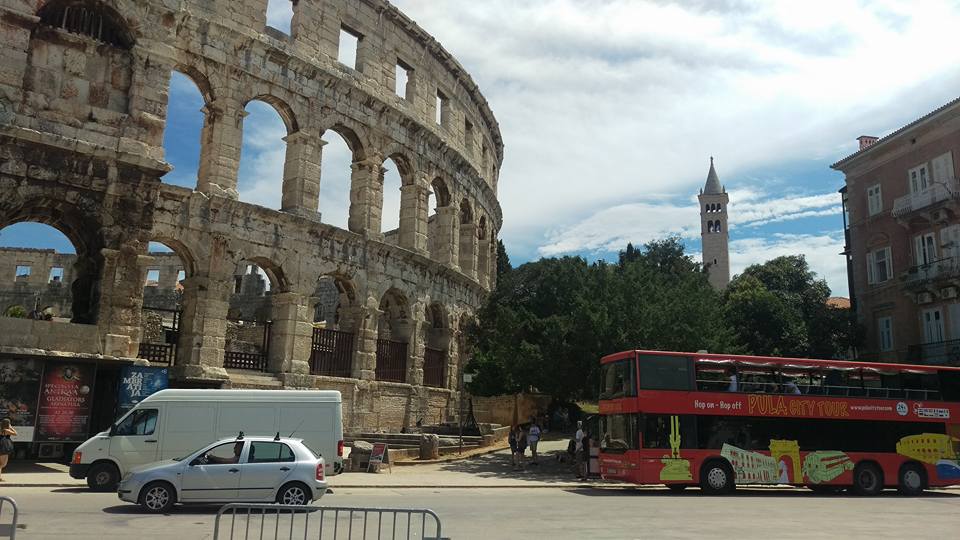
Otherwise, we both love Pula. Amazing that the Roman arena is still so intact, so beautiful! Anchoring in Cavtat, life, but a quiet bay. Visiting Dubrovnik. The views when walking the wall. Sailing by the city to see the walls.
8. Your favourite moment of your time in Croatia?
Again, can’t really just pick one. Watching the sunset from our boat. Never gets boring, and never looks the same way twice. Anchoring by one of the smaller islands or villages and watching the stars. The first time we were invited to a party even though we can’t really speak Croatian. Being told by our friends that we are Split locals, family, like one of them. Fireworks here on New Year’s Eve. Nautical flares, firecrackers, anything goes! Crazy, but fun. Same watching a Hajduk game.
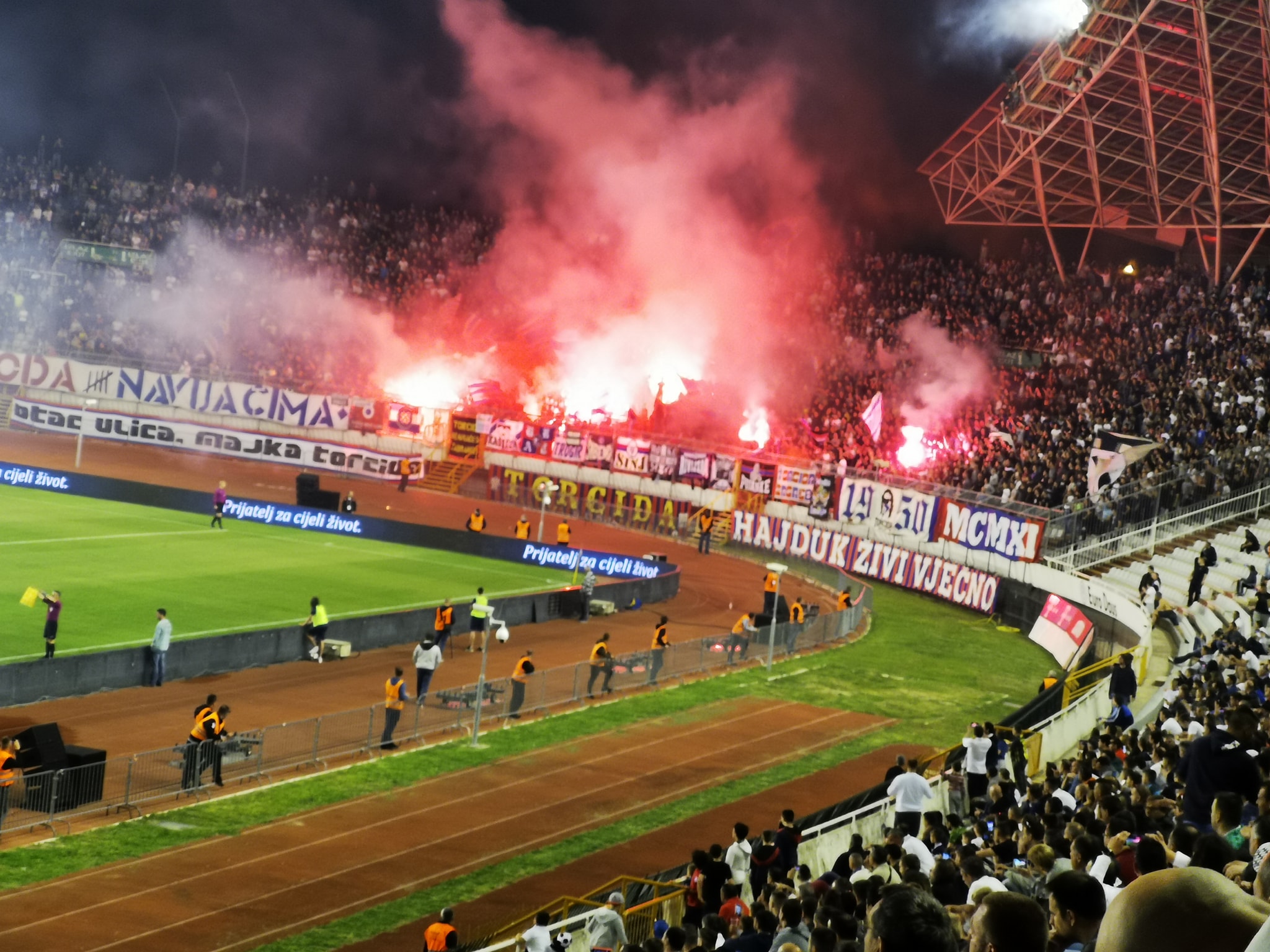
We thought English fans were supposed to be a problem, but the Torcida? Throwing flares on the pitch, setting fire to their seats? Incredible to experience. Anchoring in a bay overlooking the arena in Pula. We are British, on a South African made boat, listening to Tom Jones performing in Croatia in a Roman arena. Can’t get much more international than that!
Also, check out our friend's yacht if you're in need this summer! Yachts | Astarea – #1 Yacht & Charter in Croatia (astarea-yachting.com)
Are you an expat who would like to be featured in this series? If yes, please contact This email address is being protected from spambots. You need JavaScript enabled to view it. Subject Expat
For more, make sure to check out our dedicated lifestyle section.
5-Weekly FlyDubai Zagreb Flights from June, Seasonal Dubrovnik Line Starts June 23
May 9, 2022 - The latest flight news to Croatia as FlyDubai Zagreb flights are boosted to five times a week in June, and the seasonal Dubrovnik line begins on June 23!
FlyDubai, a low-cost airline from the United Arab Emirates, currently operates a scheduled flight between Dubai and Zagreb, and a seasonal flight between Dubai and Dubrovnik will be introduced at the end of June, reports Croatian Aviation.
FlyDubai has been operating regularly to Zagreb for several months now, while flights have been announced and canceled several times in the last two years. The partner company, Emirates, which operated on this line until 2019, canceled this route after the pandemic broke out due to low demand, and instead transferred it to a low-cost carrier.
Regular flights between Dubai and Zagreb are available 4 times a week, every Monday, Tuesday, Thursday, and Saturday. The weekly rotations will be boosted from the end of June when the line should operate on Sundays as well. FlyDubai plans to maintain this number of weekly rotations until the beginning of September.
The seasonal line between Dubai and Dubrovnik will be in traffic again from June 23, three times a week, every Thursday, Friday, and Sunday until mid-September. The line will stop traffic in early October.
On both routes to Croatia, B737 MAX8 aircraft have been announced, which in the fleet of this airline have a capacity of 166 seats (10 in business and 156 in economy class).
From June to the end of the summer flight schedule, FlyDubai offers 32,204 seats between Dubai and Zagreb, and 13,944 seats between Dubai and Dubrovnik, for a total of 46,148 to and from these two Croatian airports.
FlyDubai has a code-share agreement with Emirates so it is possible to continue the journey via Dubai with this well-known airline to a number of destinations in Africa, Asia, Australia, and New Zealand.
For more on flights to Croatia and other travel announcements, make sure to check out our dedicated travel section.


